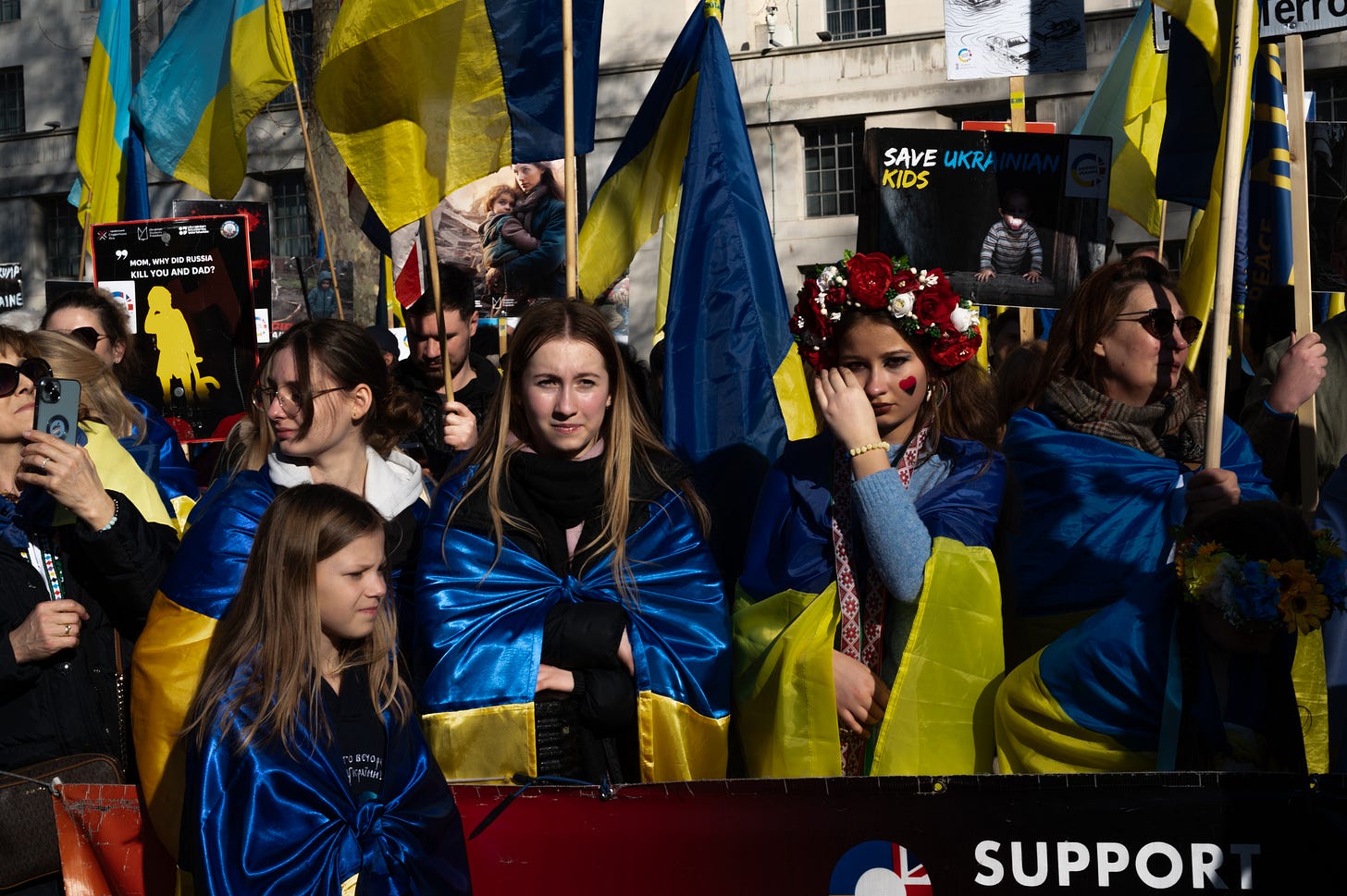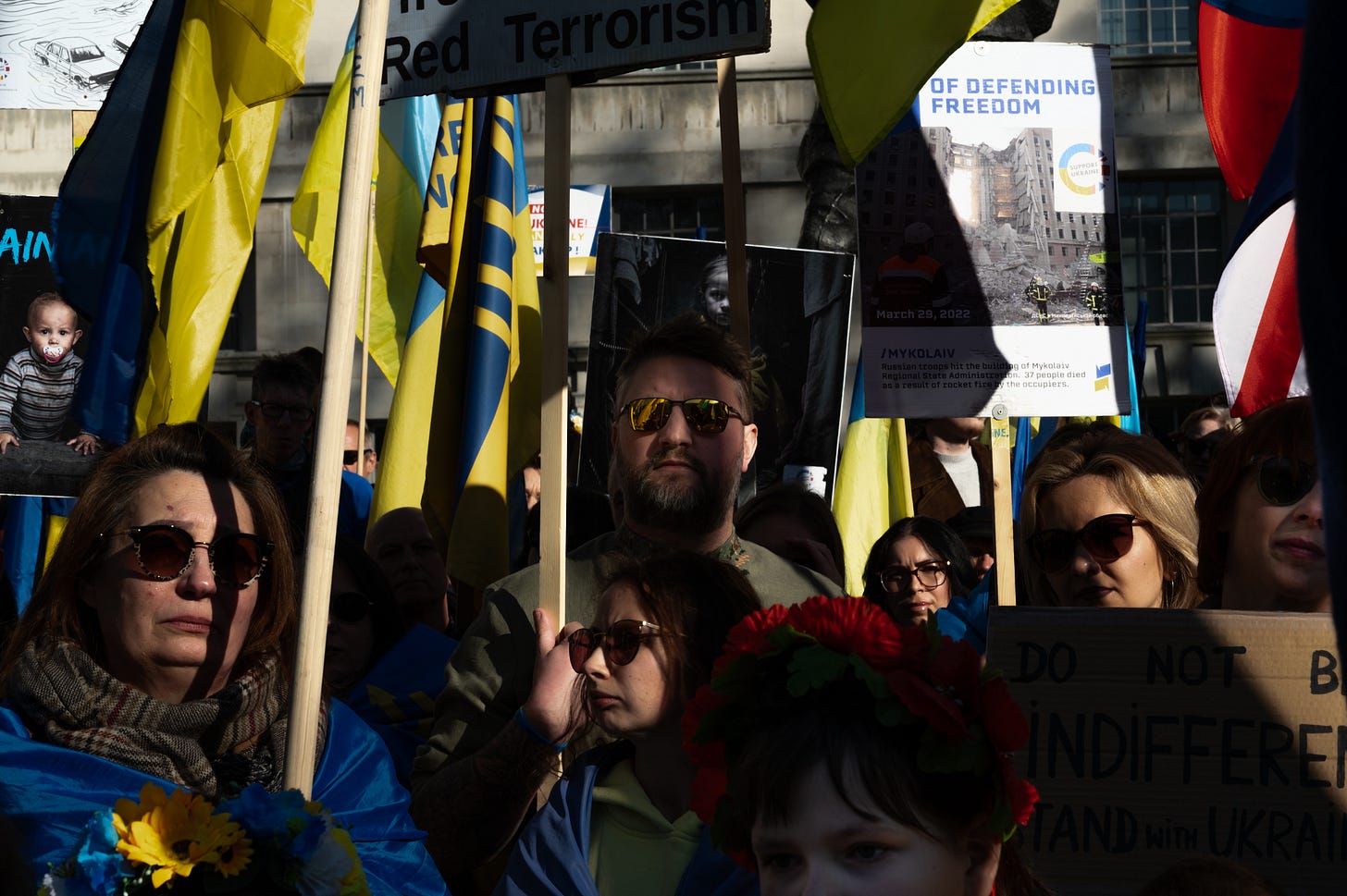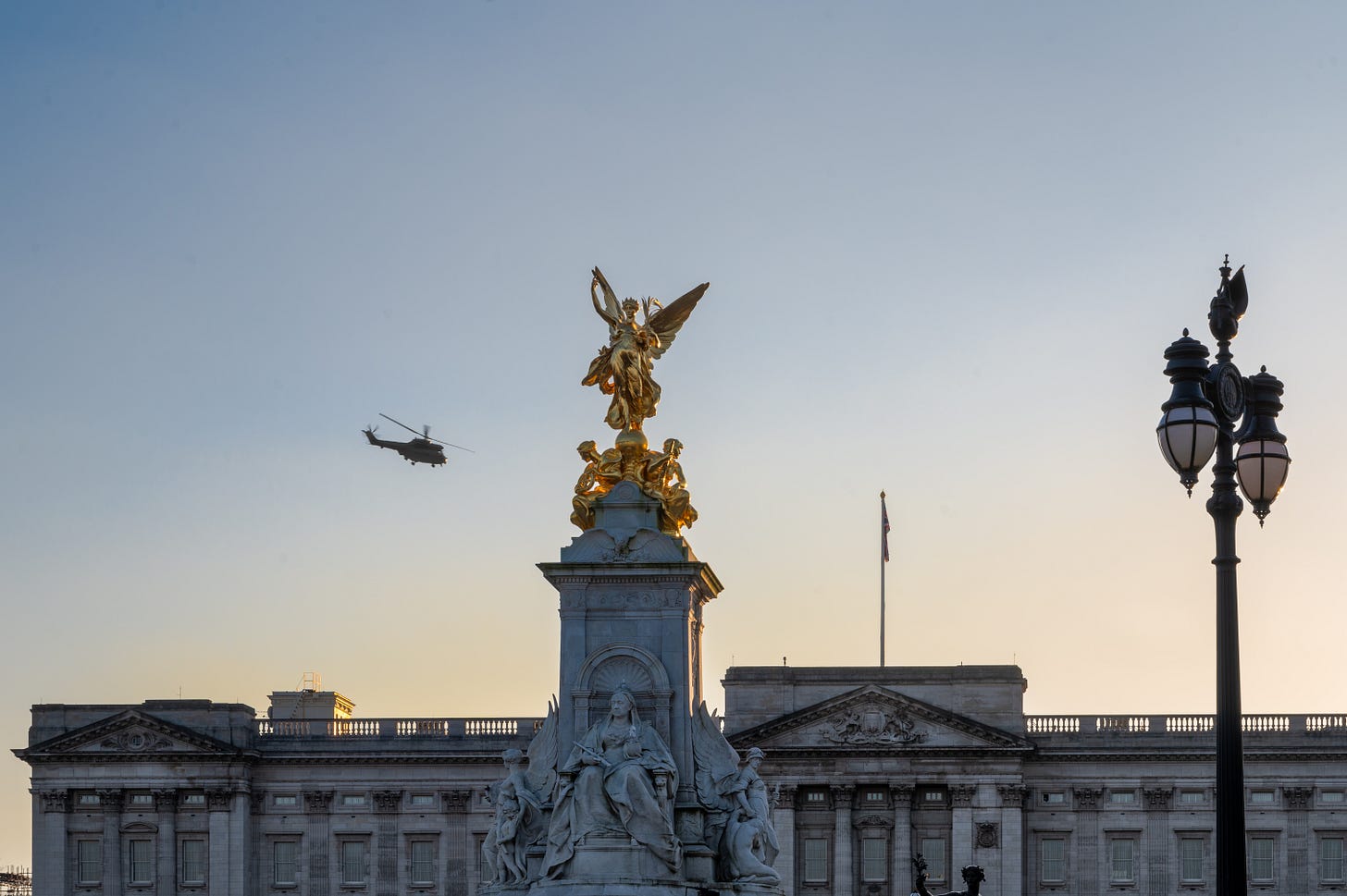Britbeats:The Churchillian Syndrome and Bye Bye aid, Reform, Russia and police.
Starmer lives a Churchillian phase, after cutting aid and lbefore welfare cuts. Reform loses an MP to the police. What about Russia?
Good morning. Apologies for the radio silence. I will do my best to summarise and analyse these eventful last two weeks in the UK, so first things first, let’s start with Keir Starmer’s Churchillian moment or Churchillian Syndrome.
The Churchillian Syndrome and Bye Bye Aid
In the last entry of the newsletter, my closing question was who, between Starmer and Meloni, was destined to become Emperor Trump’s favourite colonial leader. It sounds like we have a winner. While Meloni and Trump are certainly closer ideologically, the Italian PM was the only Global North leader invited at the inauguration and so forth, Starmer’s visit to Washington showed that he has more to offer…..for starters an invitation to Scotland for the President from King Charles III, a display of soft power.
There were a series of concerns around Starmer’s visit, from Ukraine to tariffs to “freedom of speech” a term that translates in the Trump-Musk-Vance vocabulary as freedom of hate speech (the latter issue was picked by Vice President JD Vance and pushed back by Starmer, who celebrated the tradition of free speech in the UK), but the PM arrived in Washington bearing gifts. On one hand, he had a letter from King Charles III with an official invitation to Scotland for President Trump, while on the other hand, he led the way in a significant rise in defence spending by European NATO members.
The bar set by Trump for defence spending by European members of NATO is quite high, at 5% of the GDP. Moving close to such a threshold is a mirage for most EU countries on their own, like Italy, given the entity of the Italian debt and the constraints of the Stability and Growth Pact. ReArm Europe has a clause that excludes defence spending from the deficit-GDP calculations, to implement its gargantuan budget of 800 billion Euro (over 671 billion GBP) of defence spending. As the UK does not have such constraints, Starmer arrived in Washington presenting an increase of defence spending to 2.5%, with the ambition of reaching 3% in the next Parliament.
This move certainly won approval in Washington but found disapproval within the government ranks, as Anneliese Dodds, Minister of State for Development and Minister of State for Women and Equalities resigned over what was sacrificed to achieve the rise in defence spending: UK aid.
The decision to cut UK aid echoes with the more drastic axing of USAID by the Trump Administration and a trend of abandoning aid from Global North powers which does not seem to include a new strategy currently. The cut is also going to affect the country’s climate pledge to Global South countries .
Additionally, as Dodds underlined in her resignation letter “You have maintained that you want to continue support for Gaza, Sudan and Ukraine; for vaccination; for climate; and for rules-based systems. Yet it will be impossible to maintain these priorities given the depth of the cut; the effect will be far greater than presented, even if assumptions made about reducing asylum costs hold true. The cut will also likely lead to a UK pull-out from numerous African, Caribbean, and Western Balkan nations - at a time when Russia has been aggressively increasing its global presence.”
Back to Starmer, the PM summoned an international Ukraine summit in London on March 2nd. On the same day, several Ukrainian organisations in London held a rally in front of Downing Street. I was there, and then around Lancaster House where the summit was held, with the talented photojournalist Carolina Rapezzi, you can see her pictures below. Thanks again, Carolina!
Courtesy by Carolina Rapezzi
IG: https://www.instagram.com/carolinarapezzi/
The outcome of the summit was outlined in some key points: Ukraine must be in the strongest negotiating position (1.6 billion GBP were added in UK export finance for Ukraine to “buy more than 5,000 air defence missiles which will be made in Belfast”), a “coalition of the willing” (an unfortunate callback to the Iraq invasion of 2003) with “boots on the ground and planes in the air” in Ukraine to deter Russian incursions, strong backing by the US, military support flowing from Europe to Kyiv. Still, the idea of strong backing by the US sounds quite debatable, especially since Trump has stated that he finds it easier to deal with Russia than with Ukraine.
Starmer has found himself in less than a month in two different predicaments, from being seen as an increasingly unpopular PM to the emphatic “unlikely leader of the free world” as Esther Webber wrote in POLITICO Europe.
While the rise of defence spending anticipated and likely inspired ReArm Europe all of this may also have something to do with something that every British PM has to contend with at some point: the Churchillian Syndrome.
Let’s just say that every British PM, Labour, and Tory alike at some point dreams of recapturing the “stature” of Winston Churchill.
However, this stature, or rather this idea of Churchill also hides a sort of cult that focuses on his crucial role in the war effort against NaziFascism but overlooks many crucial aspects of the British PM. The quintessential one, in the framework of World War II, was that while the Allies were fighting against NaziFascism, the UK, like France had colonial empires based on white supremacy, on the superiority over African, Caribbean, and Asian peoples. Churchill himself was deeply racist and held the British Empire as his North Star, a star that he aimed to maintain at all costs, and these costs were frequently exacted in the blood of the colonised. These elements are central in Tariq Ali (writer, filmmaker, and editor of the New Left Review) 2022 biography of Churchill, Winston Churchill His Times, His Crimes published by Verso Books.
So, Starmer rises to the central stage, while Meloni finds herself stuck in a corner, finding her ambitions as MAGA’s European bridgehead frustrated at the moment. What’s happening with Farage in the meantime?
Reform, Russia and the police
On Monday the 3rd of March, Starmer and Farage discussed in the Commons Ukraine and the PM’s visit to Washington. While Farage complimented Starmer on the visit, he also asked if the presence of thousands of US personnel in Ukraine could serve as a security guarantee and, if not, how many troops should be mobilised to Ukraine. Starmer responded to Farage reminding him that Russia is the aggressor, hitting the Reform leader with quite the blow.
This is a complicated spot, to say the least for Reform given how the ex-Reform UK Wales leader Nathan Gill was accused of taking Russian-linked bribes. Farage said in 2024 that the West provoked Russia with NATO expansion and that this led to the invasion of Ukraine.
However, domestic issues are very much on point for Farage as Reform ended up reporting one of its five MPs to the police, suspending him from the party.
The MP in question is Rupert Lowe, MP for Great Yarmouth. Lowe, who is the former chairman of Southampton FC has been of several accusations of misconduct under investigation, from threats of physical violence to party chairman Zia Yusuf and Reform has also hired a lawyer to investigate allegations of bullying from two women who worked in the MP’s office.
How this infighting is going to affect the electoral prospects of Reform remains to be seen. Three elements should keep a high focus on this: Reform stands at 25% in the polls below Labour and four points ahead of the Tories (with Badenoch’s leadership as ineffectual as always), Farage remains a Far-Right Phoenix with unlimited political resurrections and, according to Hope Not Hate’s latest State of Hate report, Reform is the biggest far-right threat to Britain.
You can read the full report here.
That is all for now, the newsletter will be back within the next seven days, if you like what you read please subscribe!






